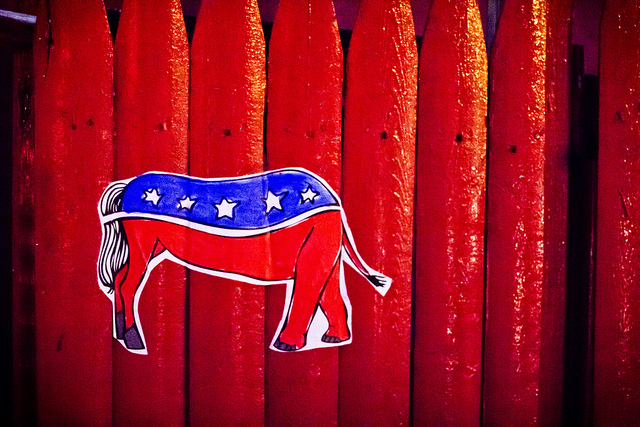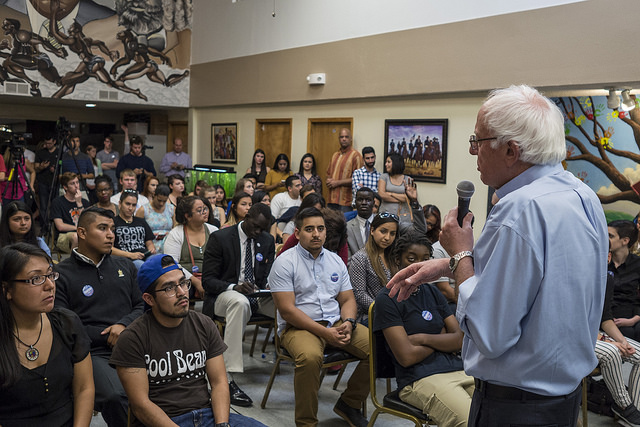Like millions of other Americans who made the decision — or mistake, depending on your point of view — to donate money to Democratic Party candidates in the past, my inbox was filled with messages for months warning me that only the generosity of ordinary citizens like myself could prevent a Republican landslide in the midterm elections. Sometimes these requests bore an air of reasonability. But most sounded desperate.
Yet for all the urgency of these solicitations, few of them gave any sense of what donors might expect in return for their support. Democratic fundraising campaigns had no problem conjuring the specter of shadowy right-wing cabals “buying” elections. But they rarely even considered the prospect that they were also selling a product.
Imagine seeing an advertisement for a toothpaste whose sole message was that it wasn’t the leading brand. The only way anyone would become passionate about this alternative is if its competitor were successfully portrayed as ineffective or, worse still, poisonous. Realistically, though, in advanced consumer societies like the United States, the number of people who might be convinced that their choice of toothpaste is a life-or-death matter is not great. Most of them know full well that the only substantive difference between mainstream brands is a matter of aesthetics, how they look or taste.
Perhaps it’s unfair to imply that the two major political parties in the United States are basically Crest and Colgate. There are some hot-button issues where the Republican and Democratic line diverge enough to result in real-world consequences: reproductive health, collective bargaining, environmental safeguards. Yet there can be no denying that more and more Americans have concluded that both parties are far more interested in self-preservation than trying to address the nation’s most pressing problems.
That’s why their approval ratings have fallen to such an abysmal level. To most middle-of-the-road visitors, the only thing worse than the party out of office is the party in office. And that’s the primary reason why the Democratic Party was bound to lose ground this election cycle regardless of its choice of strategy: holding the White House and a slim majority in the Senate was sufficient to make it the target of the electorate’s disaffection.
![Obama protest. Oakland, July 2012. [Steve Rhodes/Flickr]](http://souciant.com/wp-content/uploads/2014/11/Obama-protest.-Oakland-July-2012.-Steve-RhodesFlickr.jpg)
Aside from a few notable exceptions, such as Saturday Night Live veteran Al Franken’s Senate re-election campaign in Minnesota, Democratic politicians were marketed purely as negative space. Consider the case of Congressman Brad Schneider in Illinois. His operation relentlessly bombarded small-time donors with hectoring e-mails intended to evoke despair.
The subject headings alone tell much of the story. “This hurts”; “Downright pleading”; “Please (don’t delete!)”; “Disgusting”; “Sadly”; “Troubling news”; “Sorry to be so blunt”. Then — supposedly — there were the celebrity senders: Nancy Pelosi, Joe Biden, Joseph Kennedy III, Hillary Clinton. And the con-artist-like appeals to act before it’s too late: “According to our records, you haven’t activated your triple-match status. . . This is the FINAL OPPORTUNITY for your donation to be triple-matched”. But most unsettling of all, in the case of Schneider and most other Democratic candidates were the calls to donate money for the simple purpose of making Republicans’ fundraising advantage seem less stark. “I wouldn’t email you 3 times in 2 days if it wasn’t so important. Speaker Boehner just added another $420,000 to an already massive negative ad blitz. I don’t mean to alarm you, but the pile-on of outside spending we’re seeing could determine the fate of my first re-election campaign. . .I’m pleading. Please chip in to our campaign tonight — before it’s too late.”
Aside from repeated reminders that the candidate was a Democrat and, purportedly, a “progressive” — whatever that means to mainstream liberal voters these days — almost the entire campaign was devoted to the idea that the “dark money” of right-wing donors like the Koch Brothers could only be countered by a grassroots financial sacrifice. But when your biggest talking point is that your donor base is more decentralized than your opponent’s, even if it also happens to be less wealthy, the notion that you stand for ideological principles seems laughable.
In the end, the Democrats could have simply reduced their message to a single claim: “You should vote for us because we aren’t Republicans.” Maybe such overt cynicism would have cost them a seat or two in Congress. But it also would have saved them and their supporters a lot of money better spent on something with a more definite return on investment. Because the alternative, to give something for nothing, was asinine. Then again, the donkey is the party’s patronus.





